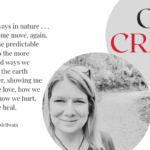It’s not unusual for poet Ruth Williams to disappear on occasion. These absences are often preceded by some sort cryptic comment from Ruth, like “I have, each year, lived past the day I will die.” Then, a week or so later, she’ll return, clutching a pile dried leaves on which she’s jotted existential musings using a sharp stick and caterpillar blood. So when Ruth came into the office to grab a copy of issue 8.1 and muttered, “How could one ever hope to have congress with another,” we realized we may not see her for a bit. Though we still haven’t tracked down Ruth, we have been finding around our building an assortment of leaves with messages scrawled in various fluids—some identifiable as the products of congress, which makes us optimistic about Ruth’s return. The following is a transcription of what we’ve collected (in sealed plastic baggies) so far:
Ruth Williams: I was walking yesterday, and I heard an owl in a nearby tree. It was a contradictory sound: at once specific, a direct “who, who,” yet otherworldly, coming from an indistinct somewhere, nowhere place. Maybe there was still an echo in my head when I read Laura Eve Engel’s poem “Reciprocity,” because its unique use of “who” jumped out to me immediately. As I read the intriguing first line, “And who bites who for a living,” that earlier “who” kept ricocheting delightfully around my head.
specific, a direct “who, who,” yet otherworldly, coming from an indistinct somewhere, nowhere place. Maybe there was still an echo in my head when I read Laura Eve Engel’s poem “Reciprocity,” because its unique use of “who” jumped out to me immediately. As I read the intriguing first line, “And who bites who for a living,” that earlier “who” kept ricocheting delightfully around my head.
In the poem, Engel makes deft use of a repeated structure, each line starting with an “And who” statement that describes the reciprocity, often strange and surreal, that exists between the two whos in the poem. Sometimes the two are in happy concert, “And who skims the scrape off whose knee,” but most times, not, “And who sends who to the bottom of a sweet drink.” Of course, each of these descriptions might also be read as a rhetorical question, one who hoping to make the other own up to his or her actions: “And who shames who into yes-making.” Who, indeed?
The repetition makes us consider how we assign blame to the others in our lives, failing to reach reciprocity. In essence, Engel wittily captures the push-and-pull at the heart of all relationships. In the last line, the poem comes to a neat close: “And who cries for who and who cries for who.” While this could be a description of a tender reciprocity, an empathetic moment between the whos, it could also be a final questioning of the relationship itself. Engel leaves it up to the reader to decide which, choosing instead to end with the sound of “who” ringing in our ears.











